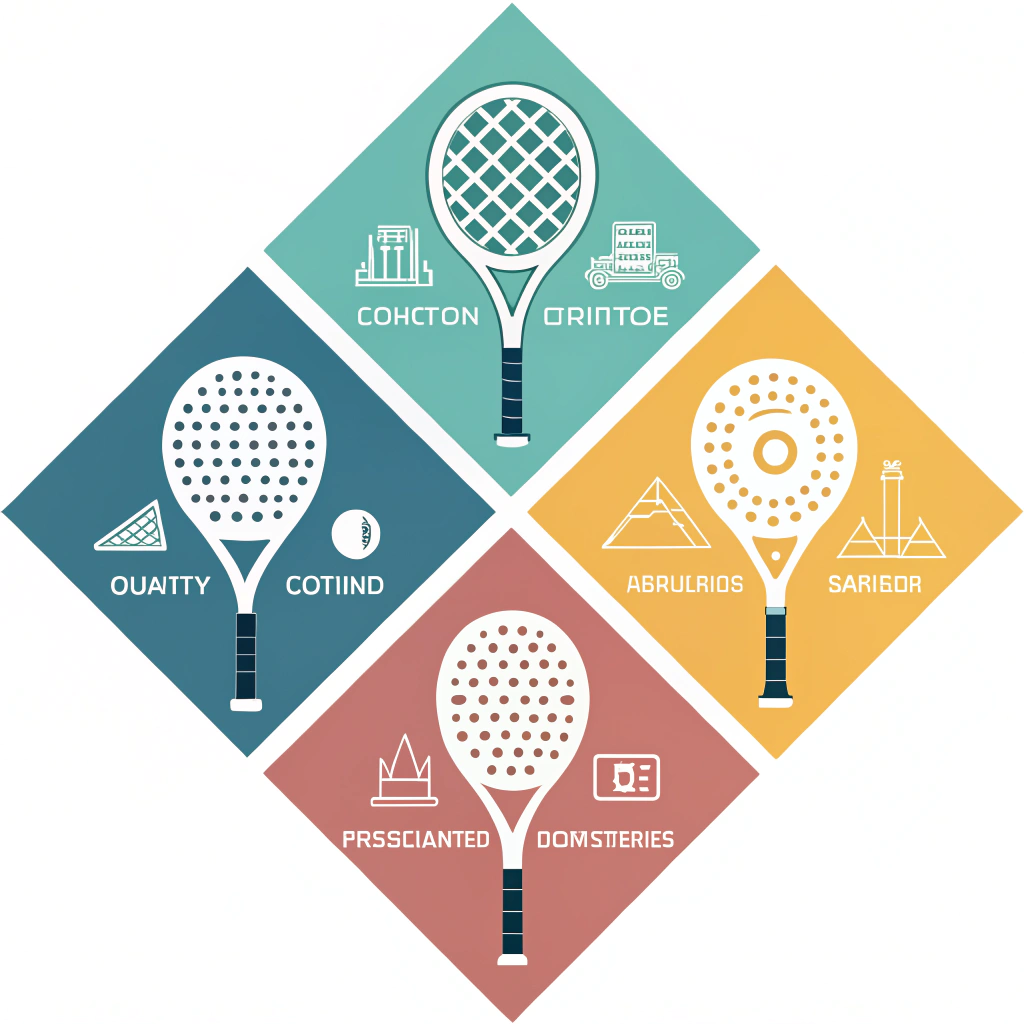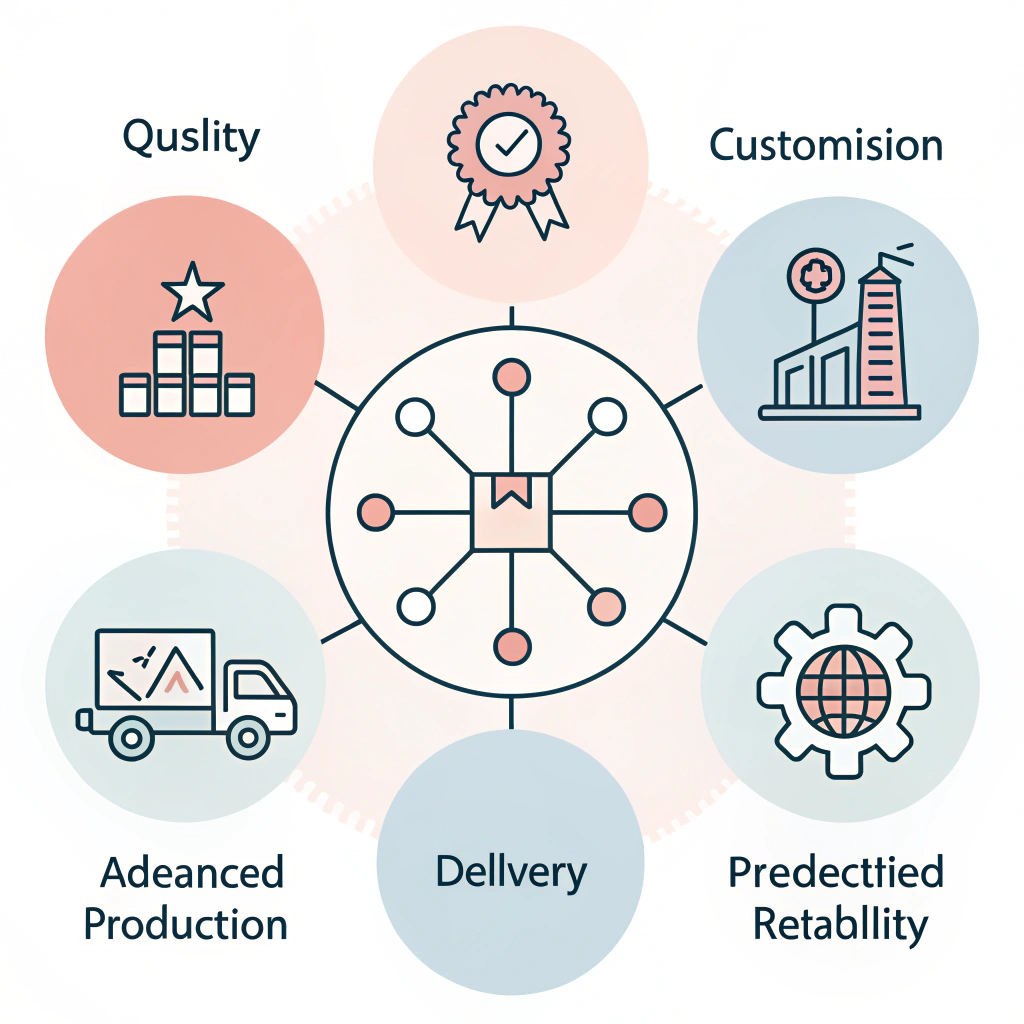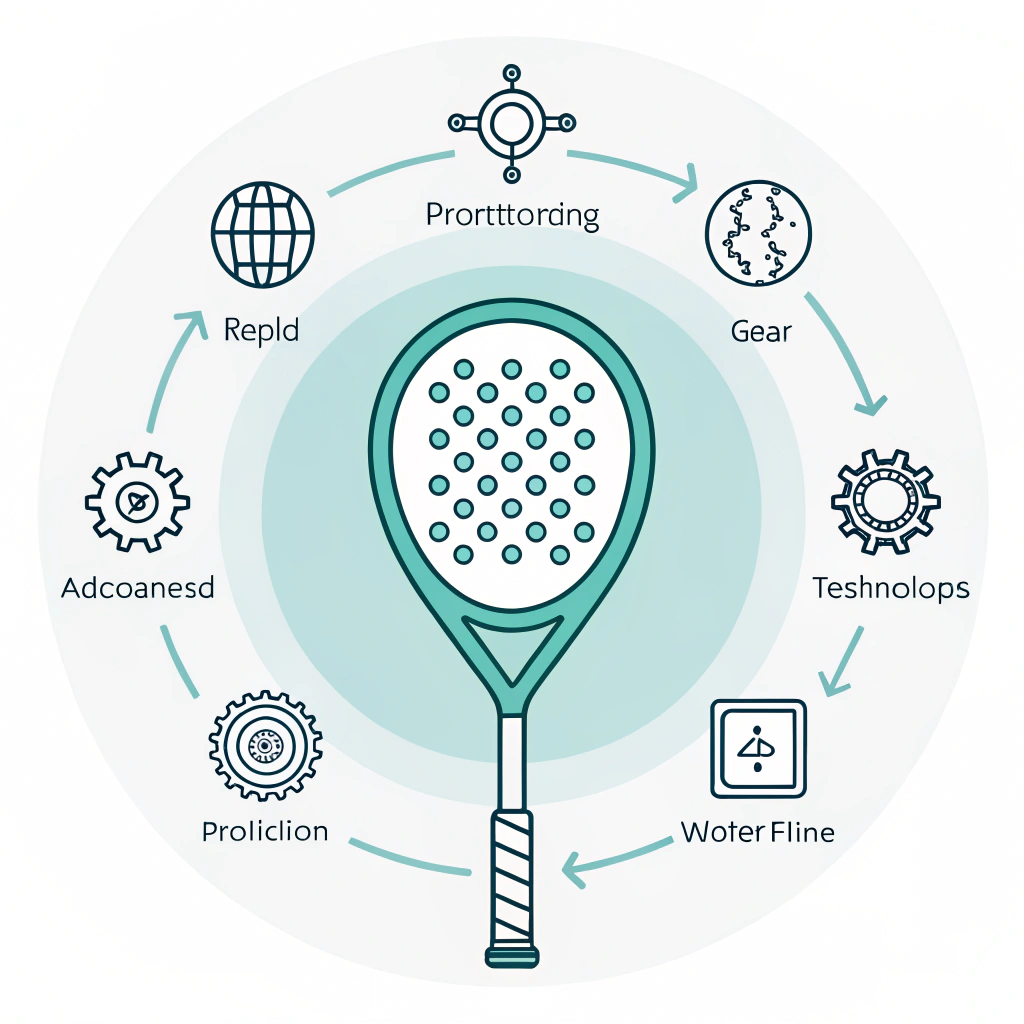The best padel racket manufacturing partners can be recognized by evaluating their material quality, production techniques, customization capabilities1, and supply chain reliability2. In other words, look for partners who use premium materials (from fiberglass to multiple grades of carbon fiber), offer rapid prototyping3 and custom design options, maintain rigorous quality control, and consistently meet delivery timelines.
In today’s competitive sports equipment market, reliable manufacturing partners are essential for producing high-performance padel rackets. With procurement managers, brand managers, and technical decision-makers seeking expertise that marries advanced production techniques with customizable design options, selecting the right supplier becomes a critical decision. The challenge lies in differentiating among manufacturers who claim to deliver on quality and efficiency, especially in an industry where materials and production precision directly impact product performance.
There are several reasons why choosing the best padel racket manufacturing partner can be difficult:
- Material Variability: The quality of raw materials, such as fiberglass and various grades of carbon fiber (3k, 12k, and 18k), plays a crucial role in the final product. Not all manufacturers are capable of handling this material diversity with precision.
- Customization Complexity: Modern padel rackets require full customization. Beyond the basic racket shape—whether Diamond, Round, or Teardrop—brands often need specialized printing, color customization, and even personalized components like hand grips and handle covers.
- Production Techniques: Advanced production techniques such as rapid prototyping, precision molding, and quality monitoring systems are non-negotiable if you aim to deliver high-performance sports gear.
- Supply Chain Reliability: Timely delivery, flexible production runs, and robust logistics ensure that manufacturers can adapt to market demands without sacrificing quality.
Understanding these issues sets the stage for a structured evaluation of your potential partners.
A systematic approach to assessing padel racket manufacturing partners is vital. Consider using the following evaluation checklist:
- Material Quality: Look for manufacturers that work with a range of premium materials. Ask about their testing procedures and quality control measures.
- Customization Capability: Evaluate whether the manufacturer can offer various racket shapes (Diamond, Round, Teardrop) and additional customization such as custom printing and personalized components.
- Advanced Production Techniques: Investigate if they employ modern production techniques such as rapid prototyping, CNC machining4, and assembly automation that ensure consistency and precision.
- Delivery and Lead Times: Consider how rapid the manufacturing process is. Fast turnaround and reliable delivery schedules are paramount in meeting market demand.
- Industry Experience and Reputation: Preference should be given to partners with a successful track record, particularly those with experience producing for well-known brands.
Material quality is perhaps the most critical factor. A quality padel racket starts with premium raw materials. Manufacturers must be adept at working with a variety of materials:
- Fiberglass: Often used for its flexibility and cost-effectiveness. Ideal for mid-range products.
- Carbon Fiber (3k, 12k, 18k): These materials vary in strength, stiffness, and weight. They are crucial for high-performance rackets where durability and performance are needed.
Reputable partners ensure that every batch of raw material goes through stringent quality checks. They use advanced testing methods to confirm the integrity and performance characteristics before production.
Modern sporting goods, particularly padel rackets, demand a high degree of customization:
- Shapes and Designs: Manufacturers should support multiple racket shapes (Diamond, Round, Teardrop) tailored to different playing styles.
- Custom Printing and Colors: Brand identity is built through unique designs and color schemes. Look for factories that excel in high-resolution printing and diverse color matching.
- Personalized Components: Beyond the racket frame, features such as hand grips and handle covers must be customizable with logos or specialized materials to meet branding requirements.
Adopting a partner who excels in these areas not only enhances your product’s market appeal but also ensures that you meet the specific needs of your target consumers.
High-performance sports gear relies on precision manufacturing. The following production techniques prove vital:
- Rapid Prototyping: Speed to market is a critical advantage. Manufacturers that can produce prototypes quickly enable faster product iterations and market responsiveness.
- Advanced Molding and CNC Technologies: Precision in molding, cutting, and assembly techniques ensures that the final product adheres strictly to developmental specifications.
- Quality Control Systems: Integrated quality monitoring throughout the production cycle can detect and rectify any deviations promptly. This includes real-time inspections and post-production testing.
These techniques not only guarantee product quality but also enhance production efficiency, making timely deliveries more consistent.
Even the best manufacturing techniques are pointless if the supply chain is unreliable. Here, you need to consider:
- Production Scalability: Can the manufacturer scale production according to demand spikes without compromising quality?
- Logistics and Inventory Management: Reliable partners maintain an efficient inventory and distribution system to ensure deliveries are on time.
- History of Timely Deliveries: Proven track records and testimonials from established brands can give you confidence in their operational efficiency.
Businesses should always look for manufacturers that not only promise but demonstrably deliver on schedule.
A practical approach is to create a comparative table to measure each potential manufacturing partner against key criteria. Below is an example:
| Evaluation Criteria | Manufacturer A | Manufacturer B | Manufacturer C |
|---|---|---|---|
| Material Quality | Uses fiberglass and high-grade carbon | Limited to basic fiberglass | Uses full range: fiberglass and 3k/12k/18k carbon |
| Customization Capability | Offers Diamond, Round, Teardrop shapes; extensive printing options | Offers limited customization | Fully customizable including hand grip/logo tailored |
| Production Techniques | Rapid prototyping, advanced molding | Standard production methods | Uses latest CNC tech, quality control systems integrated |
| Delivery Reliability | Consistent on-time delivery, scalable | Occasional delays | High reliability, proven track record with renowned brands |
| Industry Experience | Partners with reputed brands (e.g., Reebok, Starvie) | New entrant, untested | Long-term industry reputation, strong OEM/ODM relationships5 |
This table helps clarify differences and directs focus to where each partner excels or lags. Use it as a template when gathering and comparing data during supplier evaluation.
Below are some practical solutions and best practices you should follow when selecting the ideal padel racket manufacturing partner:
- Conduct In-Depth Audits: Arrange for on-site visits or third-party assessments. Evaluate the production facility environment, technology, and quality control processes first-hand.
- Request Samples and Prototypes: Before committing, test the product quality by reviewing samples. Insist on rapid prototype development to understand their production speed and ability to customize.
- Review Past Performance: Check references and client testimonials. A manufacturer with a legacy of delivering on time and supporting renowned brands is likely to provide similar outcomes for you.
- Negotiate Clear Contract Terms: Ensure that the contract clearly defines quality benchmarks, delivery timelines, intellectual property rights for custom designs, and contingency plans.
- Emphasize Communication: Establish a robust communication protocol. Regular updates on production and logistics can prevent misunderstandings and help ensure smooth operations.
- Leverage Technology: Digital tools that track order progress, quality metrics, and logistics can add an extra layer of confidence in your chosen partner.
- Plan for Scalability: Choose a partner who can grow with your business. Production scalability should be built into your agreement to accommodate potential demand increases.
At NEX Padel, we have honed our approach to manufacturing by setting high standards in material selection, production technology, and customization capabilities. As a leading manufacturer based in Jiaxing, Zhejiang, China, our focus has always been on blending craftsmanship with modern production techniques to deliver a high-performance product line.
Our collaborations with prominent brands like Hirostar, Reebok, and Starvie stand testament to our capability. We supply a range of padel rackets made from materials like fiberglass and various grades of carbon fiber, tailored to meet the diverse demands of different market segments. By offering a variety of shapes and bespoke customization options, we ensure that each product not only meets but exceeds customer expectations.
For instance, when a major sports brand required a new design featuring a unique teardrop shape along with custom printing for their logo, our rapid prototyping and advanced molding techniques played a crucial role. Our production team was able to switch quickly from concept to full-scale manufacturing without compromising quality or delivery schedules. This kind of flexibility and precision is what discerning procurement managers need to see in their ideal manufacturing partner.
Recognizing the best padel racket manufacturing partner involves clearly understanding your evaluation metrics. Here’s a brief recap and action plan:
- Define Your Standards: Establish clear criteria based on material quality, customization capabilities, production technology, and delivery reliability.
- Use Structured Evaluation: Leverage checklists and comparative tables to objectively assess each partner.
- Focus on Communication and Flexibility: Ensure the partner can effectively communicate progress and is adaptable to changes in market demand.
- Audit and Verify: Conduct on-site visits, request prototypes, and review case studies or testimonials from previous and current clients.
- Plan for the Future: Choose a partner that not only meets your current requirements but can scale and innovate as your business grows.
By meticulously following these guidelines, you can secure a manufacturer that uplifts your brand’s reputation, drives competitive advantage, and meets the ever-growing demand for high-performance padel rackets.
Q1: What factors determine the best padel racket manufacturing partners?
A1: The best manufacturing partners are determined by their ability to deliver high-quality materials, extensive customization options, advanced production techniques, and reliable supply chain management, ensuring consistency and rapid prototyping.
Q2: How can manufacturing partners ensure high durability in padel rackets?
A2: Durability is ensured through rigorous quality control, the use of premium materials such as various grades of carbon fiber and fiberglass, and precision manufacturing techniques that adhere strictly to design specifications.
Q3: What customization options are essential for padel racket manufacturing?
A3: Essential customization options include multiple racket shapes (such as Diamond, Round, and Teardrop), custom printing and color matching, as well as personalized components like hand grips and handle covers to meet brand-specific requirements.
-
Customization Capabilities: Click to learn more about how tailored production processes can drive product innovation and meet specific market needs. ↩ ↩
-
Supply Chain Reliability: Click to explore strategies for managing end-to-end logistics and ensuring on-time deliveries, critical for maintaining market competitiveness. ↩ ↩
-
Rapid Prototyping: Click to discover methods that accelerate product development cycles and enable faster market entry through iterative design testing. ↩ ↩
-
CNC Machining: Click to understand the precision and efficiency benefits of using CNC machining in high-performance manufacturing processes. ↩ ↩
-
OEM/ODM Relationships: Click to gain insight into building strategic partnerships that leverage original equipment manufacturing and design services for competitive advantage. ↩ ↩







